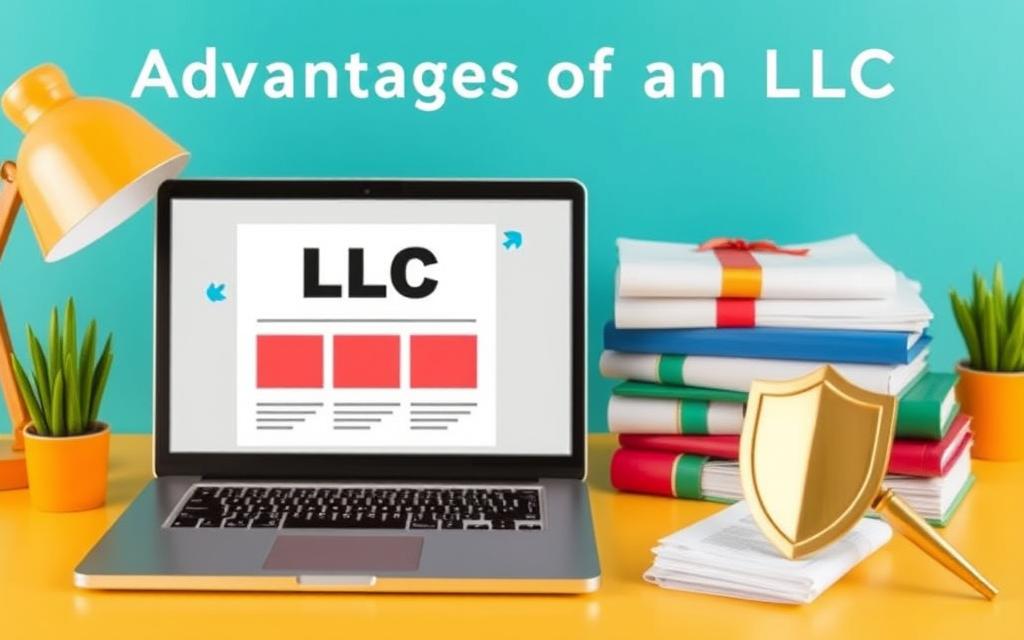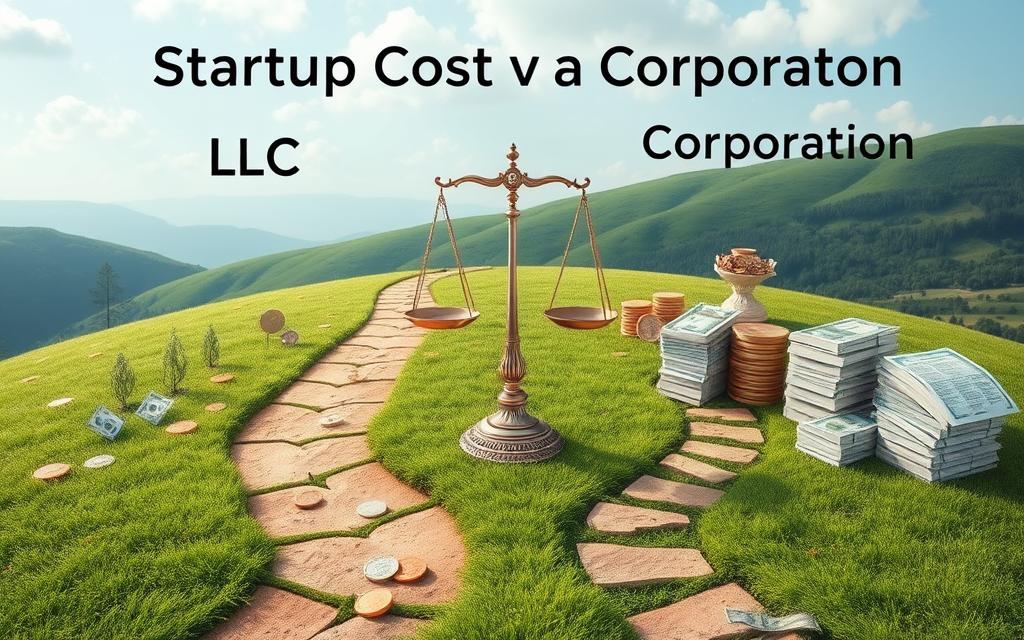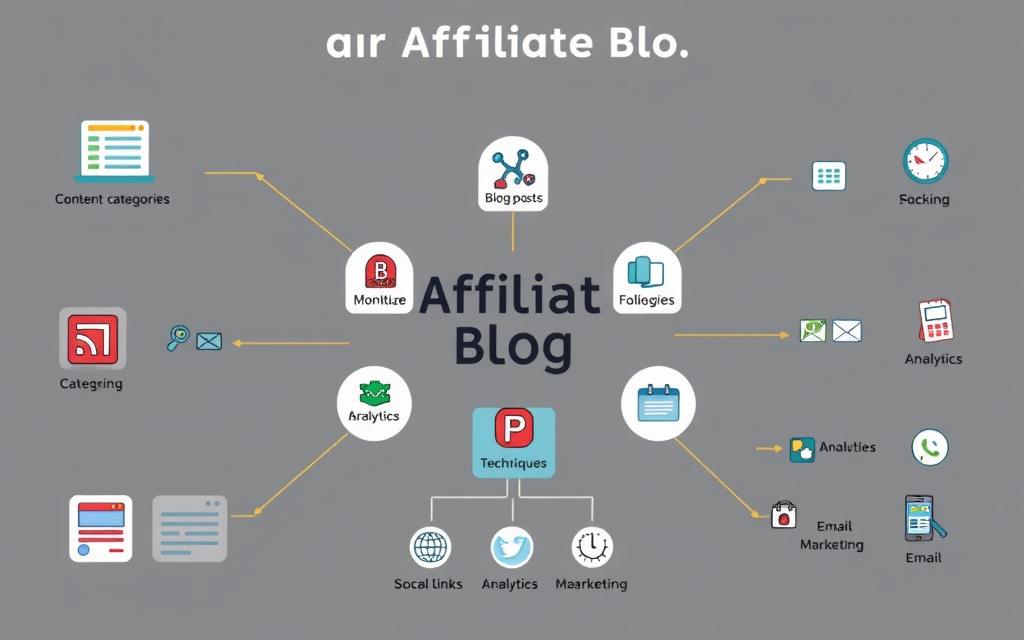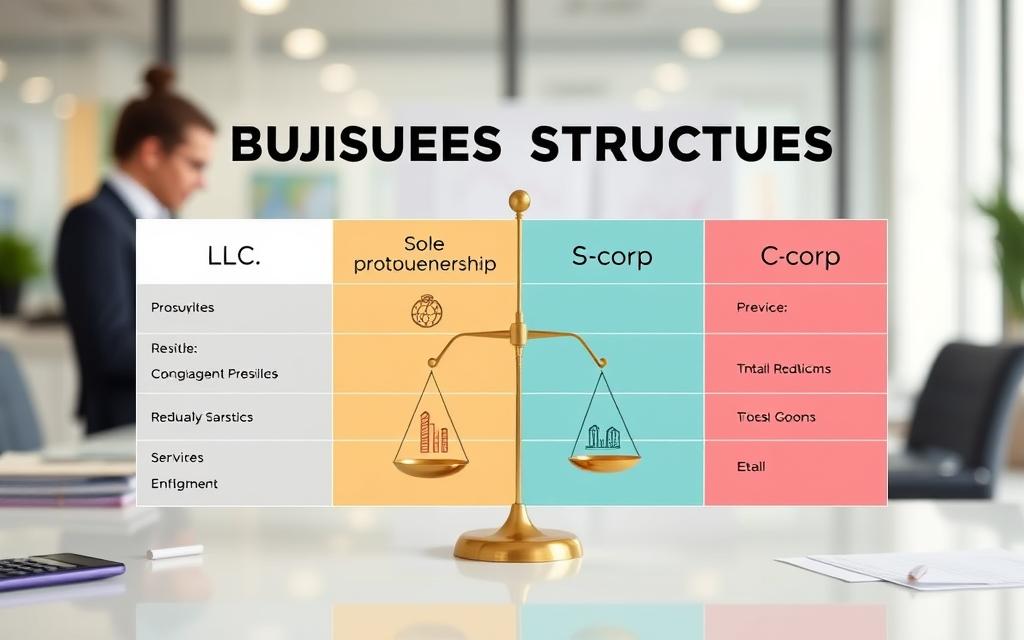Choosing between an LLC and a corporation is key for your affiliate marketing success. Both have their own benefits and things to consider. Many wonder, “Which one is right for my affiliate blog?”
This article will explore LLCs and corporations. We’ll look at what they are, their main differences, and their benefits for affiliate marketing. By the end, you’ll know which legal structure fits your business goals, risk level, and future plans.
Key Takeaways:
- LLCs and corporations have different ownership setups, management options, and tax rules.
- LLCs are simple and protect your assets, while corporations are great for raising money and offering stocks.
- Choosing between an LLC and a corporation depends on your business, growth plans, and risk concerns.
- Start-up costs and compliance rules differ, affecting your decision.
- It’s important to understand the tax and liability protection for each to pick the best for your blog.
Understanding LLCs and Corporations
Choosing the right business structure for your affiliate blog is key. Knowing the differences between a limited liability company (LLC) and a corporation is essential. Each has its own benefits, and your choice depends on your business needs and goals.
Definition of an LLC
An LLC is a flexible business structure. It combines the tax benefits of a partnership or sole proprietorship with the legal protection of a corporation. This makes LLCs a favorite among small businesses and entrepreneurs. They offer liability protection and more flexibility in management and ownership than traditional corporations.
Definition of a Corporation
A corporation is a more formal business entity. It is seen as its own legal entity, separate from its owners or shareholders. Corporations can raise capital by selling stock. They have a complex management structure with a board of directors and shareholders.
Adding AI chatbots to your website is beneficial for both LLCs and corporations. These smart interfaces improve user experience, offer 24/7 support, and help with lead generation and sales. They work well with any business structure.
“The choice between an LLC and a corporation ultimately comes down to your specific business goals and the level of structure you need.”
Understanding LLCs and corporations helps you make a smart choice for your affiliate blog. Knowing their definitions and key features is crucial for selecting the best business structure.
Key Differences Between LLCs and Corporations
Choosing the right business structure for your affiliate blog is key. LLCs and corporations have different ownership, management, and tax rules. Let’s look at what makes them unique.
Ownership Structure
LLCs are owned by members, who can be people or other businesses. Their share is based on a percentage or unit. Corporations, however, have shareholders who own stock. Their voting rights and dividends depend on their share.
Management Flexibility
LLCs let members decide how the company is run. Corporations have a formal structure. A board of directors makes key decisions.
Tax Treatment
LLCs can be taxed in different ways, depending on the owners. Corporations, though, are taxed on their profits. Shareholders also get taxed on dividends.
AI tools like GPT-3 and Jasper AI are changing things. They can make blog content, reducing the need for writers. But, how you use these tools depends on your business type.
| Characteristic | LLC | Corporation |
|---|---|---|
| Ownership | Owned by members | Owned by shareholders |
| Management | Flexible management structure | Formal management structure with a board of directors |
| Taxation | Can choose how to be taxed (sole proprietorship, partnership, or corporation) | Subject to corporate tax rate and shareholders may be taxed on dividends |
Knowing these differences helps you choose the best structure for your blog. Consider ownership, management, and taxes. Also, think about how AI tools might affect your choice.
Benefits of Choosing an LLC
Choosing between an LLC and a corporation for your affiliate marketing blog is crucial. An LLC offers many benefits for your business. Let’s dive into these advantages:
Limited Liability Protection
Many entrepreneurs choose an LLC for its limited liability protection. This means your personal assets are safe from your business’s debts and liabilities. It’s a big plus for affiliate marketing LLC owners who want to protect themselves.
Simplicity in Management
LLCs are easier to manage than corporations. They let you run your business your way. You can choose to manage it yourself or appoint managers. This flexibility is great for LLC advantages in the fast-paced affiliate marketing world.
Fewer Compliance Requirements
LLCs have fewer compliance requirements than corporations. This means less paperwork and more time to grow your affiliate marketing LLC. It’s perfect for using AI website optimization to boost your online presence.
Understanding the benefits of an LLC helps affiliate marketers make smart choices. It aligns with their goals and simplifies the process compared to corporations.

Advantages of Choosing a Corporation
Starting an affiliate blog can be a big step. Choosing between an LLC and a corporation matters a lot. One big plus of being a corporation is it’s easier to get money.
Ability to Raise Capital
Corporations can get money in a special way. They can sell shares to investors. This is great for affiliate blog owners who want to grow or use new tech, like AI website personalization.
Stock Options for Employees
Corporations can also give stock options to employees. This is a big corporation benefit. It helps you get and keep a great team for your affiliate blog.
Perpetual Existence
Another good thing about corporations is they keep going forever. They don’t stop just because the people running them change. This makes them stable and attractive to investors and customers.
In summary, corporations offer many benefits. They make it easier to get money, offer stock options, and keep going forever. These are great reasons to choose a corporation for your affiliate blog and growth.
Tax Implications of LLCs vs Corporations
Understanding taxes is key for affiliate marketers. Choosing between an LLC or a corporation has its own tax rules.
How LLCs are Taxed
LLCs are taxed differently. They don’t pay federal income tax themselves. Instead, profits and losses go to the members. They then report these on their personal tax returns.
This makes taxes simpler for many affiliate marketers.
Corporate Tax Structure
Corporations face a different tax setup. They pay federal income tax on profits. Then, shareholders pay personal income tax on dividends.
This can be a drawback. But corporations can also get tax deductions and credits LLCs can’t.
Self-Employment Tax Considerations
Self-employment taxes are another big difference. LLC members pay self-employment taxes on profits. Corporate shareholders don’t pay these taxes on dividends.
This matters a lot for those who make most of the business’s money.
AI tools can help with tax planning. They analyze data to find tax savings. This is useful for LLC taxation and corporate taxes.
By understanding tax differences, affiliate marketers can choose wisely. This choice should match their financial goals and AI data analysis for websites needs.
Compliance Requirements for Each Structure
Understanding LLC compliance and corporate regulations is key. Each business type has its own set of rules. LLCs and corporations face different annual filing and reporting needs.
LLC Annual Requirements
LLCs have fewer rules to follow than corporations. LLC compliance includes:
- Filing an annual report or statement of information with the state
- Paying state and federal taxes
- Keeping accurate records of the LLC’s activities and finances
- Following state-specific rules
Corporate Compliance Obligations
Corporations have more corporate regulations to follow. This includes:
- Hosting regular shareholder and board of director meetings
- Keeping detailed meeting minutes and records
- Filing annual reports with the state and federal government
- Meeting state and federal tax requirements
- Reporting stock issuances and dividends properly
Businesses can use AI security tools for websites to make compliance easier. These tools help with filing documents, preparing taxes, and keeping records. They help your business meet legal and financial obligations, avoiding penalties and legal problems.
Liability Protection: LLC vs Corporation
Starting an affiliate blog means making a key choice: LLC or corporation. This choice affects your liability protection and business structure.
Personal Liability Shield
Both LLCs and corporations offer liability protection. They shield your personal assets from your blog’s debts or legal issues.
This protection is vital for affiliate marketers. It keeps your personal finances safe from risks or legal problems from promoted products or services.
Implications for Affiliate Marketing
The choice between an LLC and a corporation affects your affiliate blog’s legal structure. Corporations are better for raising capital and growing, but LLCs are simpler and might have better taxes.
LLCs are great for small, agile blogs. They have fewer rules and might save you money on taxes. Corporations are better for bigger plans and more complex operations.
Choosing between an LLC and a corporation depends on your goals and needs. Think about your business’s future and how much protection you need. Get advice from legal and tax experts to make the best choice.
It’s also key to choose the right AI tools for your blog. AI can help with content, fraud, and privacy. This boosts your business’s safety and liability protection.
Start-Up Costs: LLC vs Corporation
Starting a new business comes with initial costs that matter a lot. You might choose to form an LLC or a corporation. Knowing the costs helps with planning and budgeting. Let’s look at the start-up costs for both.
Initial Formation Expenses
Forming an LLC is usually cheaper than starting a corporation. The cost to start an LLC is between $50 and $500, based on the state. Starting a corporation can cost more, from $300 to $1,000 or more, depending on where you are.
Ongoing Costs and Fees
Both LLCs and corporations have ongoing costs. LLCs have annual filing fees, from $50 to $800. Corporations have higher costs, like annual reports and franchise taxes, which can be $500 or more a year.
Using AI customer support tools can help lower costs for both LLCs and corporations. These tools automate tasks, making operations smoother and cheaper.
| Cost Category | LLC | Corporation |
|---|---|---|
| Initial Formation | $50 – $500 | $300 – $1,000+ |
| Ongoing Annual Fees | $50 – $800 | $500+ |
Choosing between an LLC or a corporation means looking at start-up and ongoing costs. This helps ensure your business can succeed in the long run.

Choosing the Right Structure for Your Affiliate Blog
Deciding on a business structure for your affiliate blog is crucial. You have to choose between an LLC and a Corporation. This choice affects your operations, growth, and success. Think about your current needs and future goals when picking a affiliate blog business structure.
Evaluating Your Business Model
First, look at your affiliate blog business model. Are you working alone, or will you have partners or investors? Will your blog make money mainly from affiliate marketing, or will you offer other services or products? Knowing your business well helps you choose the right legal structure.
Considering Future Growth
Think about your future growth aspirations. Do you want to grow your blog into a big company, or keep it small? The structure you pick should help you grow. It should also support your plans for raising money, hiring great people, or using website AI integration.
By carefully thinking about your business and future plans, you can make a smart LLC vs corporation decision. This choice will help your affiliate blog succeed now and in the future.
How to Set Up an LLC or Corporation
Starting a business can seem hard, but knowing the steps for an LLC or corporation makes it easier. Whether you’re incorporating a business or forming an LLC, the right steps can help your affiliate blog succeed.
Step-by-Step Guide for LLC Formation
- Choose a unique and available business name for your LLC.
- Appoint a registered agent to receive official documents on behalf of your LLC.
- File the Articles of Organization with your state’s business filing office.
- Create an operating agreement to outline the ownership and management structure of your LLC.
- Obtain any necessary business licenses or permits required in your state or local jurisdiction.
- Acquire an Employer Identification Number (EIN) from the Internal Revenue Service (IRS).
- Open a dedicated business bank account to separate your personal and LLC finances.
Step-by-Step Guide for Corporation Formation
Incorporating a business as a corporation has a similar but different process:
- Choose a unique and available corporate name for your business.
- Appoint a registered agent to receive official documents on behalf of your corporation.
- File the Articles of Incorporation with your state’s business filing office.
- Develop corporate bylaws to govern the operations and decision-making of your corporation.
- Hold an organizational meeting to appoint directors and officers, and issue stock certificates.
- Obtain any necessary business licenses or permits required in your state or local jurisdiction.
- Acquire an Employer Identification Number (EIN) from the Internal Revenue Service (IRS).
- Open a dedicated business bank account to manage your corporate finances.
To make the LLC formation process or incorporation of a business easier, use AI content generation tools. These tools help with documents and filings, saving time and ensuring you follow the law.
Common Misconceptions About LLCs and Corporations
There are many myths about LLCs and corporations. These myths can cause entrepreneurs and small business owners to make bad choices. By clearing up these myths, we can help them make better decisions that fit their needs and goals.
Myths About LLCs
- LLCs are only for small businesses: This is a common misconception. LLCs can be suitable for businesses of all sizes, from solo entrepreneurs to large enterprises.
- LLCs are less professional than corporations: On the contrary, LLCs provide the same level of legal protection and legitimacy as corporations, with a more flexible and streamlined structure.
- LLCs are more complex to set up and maintain: While there are some administrative requirements, the formation and ongoing compliance for LLCs are generally simpler and less burdensome than for corporations.
Myths About Corporations
- Corporations are always the best choice for larger businesses: This is not always the case. Corporations have their own set of advantages and disadvantages, and the choice between an LLC and a corporation should be based on the specific needs and goals of the business.
- Corporations provide more legal protection: Both LLCs and corporations offer strong liability protection for their owners, with the specific details varying based on the jurisdiction and the structure of the business.
- Corporations are more difficult to manage: While corporations have additional compliance requirements compared to LLCs, modern technology and AI-powered data analysis tools can streamline the management and decision-making processes for corporations of all sizes.
By understanding and debunking these common myths, business owners can make more informed decisions about the most suitable business structure for their affiliate blogs and other ventures. Leveraging AI-powered data analysis can further enhance this decision-making process, providing valuable insights to support the selection of the optimal LLC or corporation structure.
Conclusion: Making the Best Choice for Your Blog
Recap of Key Points
In this article, we looked at the main differences between LLCs and corporations. We talked about their benefits and what to consider for affiliate bloggers. Each type has its own perks, like how you own and manage the business, taxes, and rules you must follow.
Final Thoughts on LLC vs Corporation
Choosing the right business structure for your blog is not easy. It depends on your needs, like how much protection you want, your growth plans, and using AI tools. By weighing the good and bad of LLCs and corporations, you can pick the best for your blog’s future.
It doesn’t matter which one you choose. Keeping up with affiliate marketing trends and using AI tools is key. These tools can make your blog more visible, better for users, and more profitable. All these are crucial for your business to grow and succeed online.












Leave a Reply